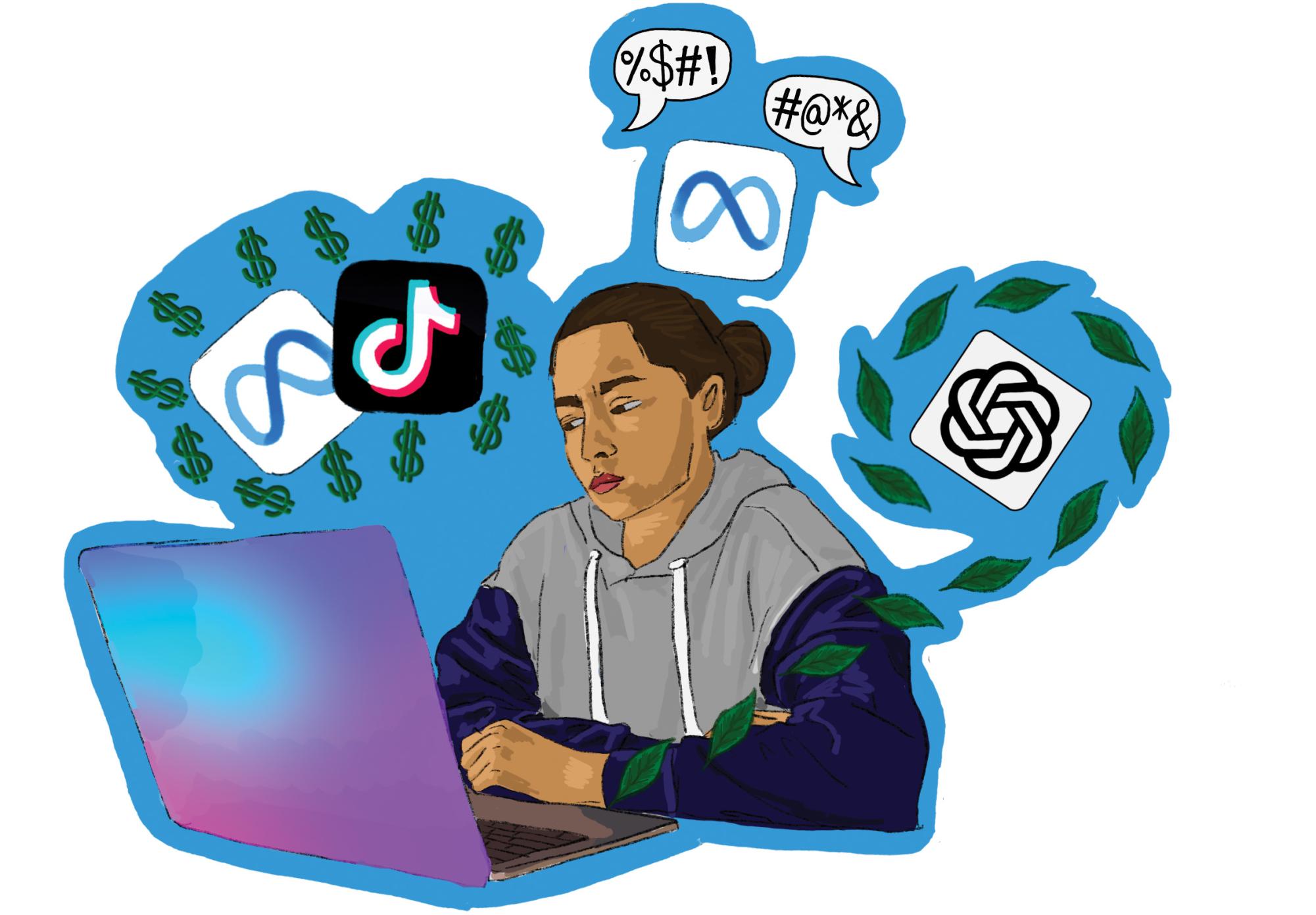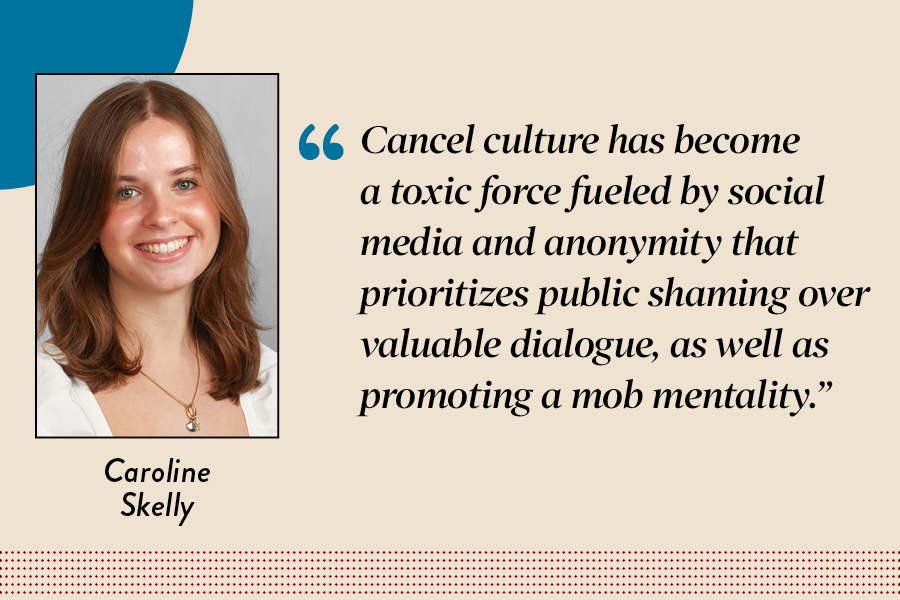Troubling Tech
Social media platforms such as TikTok, Instagram and Facebook have become vital parts of a teenager’s daily life. As you scroll through Instagram or TikTok liking posts and videos, you might not know that every movement you make is being tracked.
While social media offers connection and entertainment, the extensive tracking of users poses a serious threat to users, enabling data breaches, manipulating consumer behavior, and turning them from person to product.
TikTok has faced persistent scrutiny for its data-selling practices. TikTok states that the app collects much more data than needed to curate your feed. Its privacy policy states that the app collects your IP address, user agent, identifiers for advertising purposes, model of your device, network type, device IDs, screen resolution and operating system, app and file names and types, keystroke patterns or rhythms, battery state and much more. Critics argue that such invasive practices are not required to provide the personalized content that users consume. Compounding that, TikTok’s parent company, ByteDance, is a Chinese-based company, meaning that the Chinese government can request any information they want, leaving TikTok in a vulnerable state toward criticism.
TikTok isn’t the only offender of lucrative privacy policies. Meta has similar privacy policies for data. Through its multiple platforms — Instagram, WhatsApp, Facebook and more — Meta collects location data, camera use, the time, frequency and duration of app activities, and much more to curate content for its users. In the past, Facebook was exposed for using data to politically manipulate users.
These practices are disguised behind a veil of tailored advertisements and personalized feeds. Creating and collecting detailed profiles on users and their whereabouts provides the opportunity for data leaks, identity thieves and other malicious actors. This can lead to many future issues for users as they can struggle to regain a standing in society after having their identity stolen and image ruined. Moreover, this disintegration of privacy has users feeling helpless, knowing that their every click, like, comment and movement is tracked. This can destroy a user’s mental health and foster a negative environment that slowly erodes their person.
While critics and companies might argue that these practices and policies are just to improve user experience, it is imperative that users demand for greater accountability and transparency from companies. Legislation must be passed in order to protect user data instead of valuing profit-driven algorithms of companies. Social media platforms should be held accountable, ensuring that users can engage online without fear of exploitation.
A few weeks ago, a friend and I had a late-night conversation about something that now seems impossible to be fixed in 2025, use of ChatGPT. While we started by discussing how artificial intelligence is affecting academic integrity standards and how students approach assignments, our conversation shifted to something even bigger: AI’s environmental effects.
AI has become deeply embedded in people’s daily lives as they just turn to ChatGPT for anything they find tedious. Few people consider the resources it consumes. According to MIT Technological Review, training a single AI model can emit as much carbon as five cars, while the United Nations Environment Programme states that AI’s energy consumption is a growing concern, as it relies on massive computational resources which contributes to growing global carbon emissions. Despite such negative environmental effects, AI’s benefits — in medicine, the economy and other ways — are too important for us to ignore.
Consider how AI can assist in many aspects of health care. AI enhances diagnostic accuracy and efficiency by detecting medical issues that might be overlooked by the human eye. According to Harvard Medical School, AI improves colonoscopy procedures by identifying polyps, and it aids in interpreting electrocardiograms and CT scans for early disease detection..
AI boosts economic productivity and creates job opportunities. The University of Cincinnati reports that AI-driven automation is increasing efficiency in industries like finance, retail and manufacturing, allowing it to operate with greater precision. However, the Brookings Institution warns that automation could displace workers, particularly in routine-based jobs. Still, throughout history, technology was what advanced job markets. During the Industrial Revolution, while many manual labor jobs were lost to machines, new roles emerged in engineering, mechanics and logistics. According to EMPEQ, AI’s automation of routine tasks is increasing demand for skilled professionals in engineering. Advances in AI will open up room for jobs in AI development and system management.
AI is even helping to fight climate change — the very issue it exacerbates. UNEP, which published papers on AI’s negative impacts, also states that AI can optimize renewable energy deployment by predicting energy demand and managing energy supply more efficiently. According to Yale School of Environment, by tracking air emissions and supporting process and supply chain optimization, AI can assist in environmental monitoring and management.
At the end of that late-night conversation, my friend and I never really reached a conclusion. What we did realize was that, just like in academics, AI’s role in society is not black and white. It definitely has flaws, and while its environmental impact is one of its biggest flaws, the benefits it brings to health care, the economy and the environment are undeniably important. Its ability to save lives, drive economic growth and, ironically, fight climate change ultimately outweighs its drawbacks and makes AI development a more viable solution than just abandoning it altogether.
In the midst of misinformation, the rise of artificial intelligence and political divides becoming more and more extreme, Meta announced that all Meta apps would no longer fact-check any posts. On Jan. 7, Meta CEO Mark Zuckerberg made the announcement, adding that he would not renew the fact-checking program. While this tool was intended to limit misinformation like what Russians spread on Facebook during the 2016 election to benefit Donald Trump, he said it actually caused more harm than good. Mr. Zuckerberg claimed that without fact checking, people who use Meta’s platforms would be able to express themselves more and use their free speech without censorship.
Despite Mr. Zuckerberg’s claims about the motivation for ending fact-checking, it’s just a blatant attempt to gain and maintain conservative allyship at the expense of truth and democracy.
This change will help Meta and Mr. Zuckerberg to get on President Trump’s good side after being the target of Mr. Trump’s anger and aggression. Mr. Trump had threatened Mr. Zuckerberg with life in jail, claiming he helped rig the 2020 election against Mr. Trump. In other policy changes suggesting Mr. Zuckerberg’s attempt to get on Mr. Trump’s good side, Meta has also made leadership changes and brought Trump friend and supporter Dana White onto Meta’s board. Not only does this show Meta’s changes are securing a place in the “broligarchy,” but Mr. Zuckerberg is also attempting to make sure Meta won’t come under fire during this new administration.
Mr. Trump and other Republicans have made claims that Meta’s fact-checking program is biased toward conservatives. Joel Kaplan, Meta’s new head of global policy, said on “Fox & Friends” that there is too much political bias in the fact-checking program. These claims are false. Meta, playing into this false claim, shows where its political alliances lay.
Meta’s removal of its fact-checking features will only turn its platforms more conservative. This isn’t the first time a social media company has done this — Elon Musk removed the same policies when he took over Twitter and rebranded it as X. As seen with that platform, it quickly became a right wing heaven. According to a 2023 Pew Research Center poll, after Musk’s acquisition of Twitter (now X) more Republicans felt the platform was good for American democracy while more Democrats felt it was worse. Additionally, there was a skyrocketing of Tweets with racial slurs after the acquisition. These changes to X can be expected to be seen on Meta platforms, shifting the social media app’s priorities with the change of administrations.
Meta’s changes and attempts to sway the current administration display a lack of true care for democracy and freedom of speech — principles Mr. Zuckerberg claims to stand for.

















